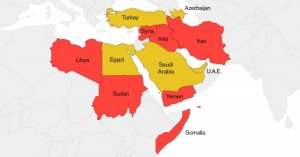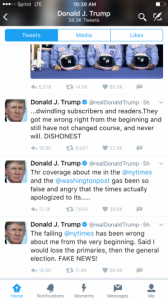- Joined
- Sep 10, 2003
- Messages
- 9,731
As of yesterday, all "radical islamic terrorists" are barred entry to the US.
https://www.nytimes.com/2017/01/27/us/politics/trump-syrian-refugees.html?ref=todayspaper
WASHINGTON — President Trump on Friday closed the nation’s borders to refugees from around the world, ordering that families fleeing the slaughter in Syria be indefinitely blocked from entering the United States, and temporarily suspending immigration from several predominantly Muslim countries.
In an executive order that he said was part of an extreme vetting plan to keep out “radical Islamic terrorists,” Mr. Trump also established a religious test for refugees from Muslim nations: He ordered that Christians and others from minority religions be granted priority over Muslims.
“We don’t want them here,” Mr. Trump said of Islamist terrorists during a signing ceremony at the Pentagon. “We want to ensure that we are not admitting into our country the very threats our soldiers are fighting overseas. We only want to admit those into our country who will support our country, and love deeply our people.”
Earlier in the day, Mr. Trump explained to an interviewer for the Christian Broadcasting Network that Christians in Syria were “horribly treated” and alleged that under previous administrations, “if you were a Muslim you could come in, but if you were a Christian, it was almost impossible.”
“I thought it was very, very unfair. So we are going to help them,” the president said.
In fact, the United States accepts tens of thousands of Christian refugees. According to the Pew Research Center, almost as many Christian refugees (37,521) were admitted as Muslim refugees (38,901) in the 2016 fiscal year.
The executive order suspends the entry of refugees into the United States for 120 days and directs officials to determine additional screening ”to ensure that those approved for refugee admission do not pose a threat to the security and welfare of the United States.”
The order also stops the admission of refugees from Syria indefinitely, and bars entry into the United States for 90 days from seven predominantly Muslim countries linked to concerns about terrorism. Those countries are Iraq, Syria, Iran, Sudan, Libya, Somalia and Yemen.
http://www.bbc.com/news/world-us-canada-38783512
Rights groups have filed a lawsuit in a New York court to demand the release of refugees in transit who have been detained at John F Kennedy airport.
Entry to the US for nationals of seven Muslim-majority countries has been stopped for 90 days by Donald Trump.
The exact implications of his order remain unclear. The US State Department has told the BBC it is working on the immediate implementation of the ban.
People fleeing Syria are banned until further notice.
The two Iraqi refugees detained in New York, one of whom had worked as a US Army interpreter, were in transit when the executive order was signed on Friday.
The National Immigration Law Centre (NILC) told the BBC that it was suing President Trump and the secretary of the Department of Homeland Security.
It described the two Iraqis as "courageous Haneed Khalid Darweesh, who interpreted for US army & Haider Sameer Alshawi also targeted for aiding US military".
The organisation had been unable to speak to the two men, it said.
The American Civil Liberties Union (ACLU) is one of several other rights groups also involved in the lawsuit, filed in the Eastern District of New York on Saturday morning.
Lawyers are "keeping tabs on several flights" the NILC told the BBC, but did not have a full number of people who had been detained at US airports.
On Saturday several Iraqi passengers and a Yemeni national were prevented from boarding a flight at Cairo airport bound for New York, despite holding valid visas for the US.
Key points of refugee and travel suspension
Trump's 'extreme vetting' order sows panic
Google has urged travelling staff members who are nationals of the seven countries affect to return to the US as quickly as possible.
Friday's wide-ranging order includes the following measures:
The suspension of the entire US refugee admissions programme for 120 days
A ban on all refugees from Syria until "significant changes" are made
A 90-day suspension on anyone arriving from Iraq, Syria, Iran, Libya, Somalia, Sudan, and Yemen, except certain visa categories such as diplomats
Priority for future refugee applications from those persecuted for their religion - but only if the person is part of a minority religion in their home country
A cap of 50,000 refugees in 2017 - less than half of the upper limit under Mr Trump's predecessor, Barack Obama
Mr Trump signed the order on Friday, which was International Holocaust Remembrance Day.
The president's statement to mark that occasion, on the 72nd anniversary of the liberation of Auschwitz, made no mention of Jews or anti-Semitism.
In response to Mr Trump's order, the United Nations refugee agency said the needs of those fleeing conflict had never been greater.
The Council on American Islamic Relations (CAIR) also says it will file a lawsuit.
Refugees from Syria's civil war will not be granted entry to the US
There have been reports of "green card" holders, who are legal permanent residents of the US, being prevented from getting on flights. However, green cards are not specifically mentioned in the executive order, and so the status of green card holders remains unclear.
CAIR advised non-US citizens, including permanent residents, from the seven countries to plan to delay all international travel for at least 90 days.
Mr Trump said the measures detailed in his executive order would "keep radical Islamic terrorists out of the US".
But rights groups say there is no link between Syrian refugees in the US and terrorism.
The sudden and severe immigration restrictions imposed on passport holders from seven Muslim countries could seriously demonstrate the law of unintended consequences. The president wants to restrict some Muslims but the effect could be to damage America's most important and profitable sector: technology.
Google has recalled around 100 of its affected staff from overseas. Microsoft has warned its shareholders that curbs on immigration could have a material impact on its business.
The technology sector relies heavily on highly skilled and well-paid workers from overseas on H1-B visas. If there's a risk, however small, that that brainpower could be restricted in some way or scare off others who may feel unwelcome, the big tech companies may have to rethink where they place their key staff in future.
Some Republicans have welcomed Mr Trump's announcement, including the Speaker of the House of Representatives, Paul Ryan, who said it was "time to re-evaluate and strengthen the visa vetting process".
The order also said all immigration programmes should include questions to "evaluate the applicant's likelihood of becoming a positively contributing member of society."
Other measures include a broad review of the information required from all countries to approve a visa; a review of visa schemes between nations to ensure they are "truly reciprocal" for US citizens; and the immediate suspension of the Visa Interview Waiver Programme.
But the document says exceptions could be made on a case-by-case basis.
During the election campaign, Mr Trump suggested a "total and complete shutdown of Muslims entering the United States until our country's representatives can figure out what is going on".
https://www.nytimes.com/2017/01/27/us/politics/trump-syrian-refugees.html?ref=todayspaper
WASHINGTON — President Trump on Friday closed the nation’s borders to refugees from around the world, ordering that families fleeing the slaughter in Syria be indefinitely blocked from entering the United States, and temporarily suspending immigration from several predominantly Muslim countries.
In an executive order that he said was part of an extreme vetting plan to keep out “radical Islamic terrorists,” Mr. Trump also established a religious test for refugees from Muslim nations: He ordered that Christians and others from minority religions be granted priority over Muslims.
“We don’t want them here,” Mr. Trump said of Islamist terrorists during a signing ceremony at the Pentagon. “We want to ensure that we are not admitting into our country the very threats our soldiers are fighting overseas. We only want to admit those into our country who will support our country, and love deeply our people.”
Earlier in the day, Mr. Trump explained to an interviewer for the Christian Broadcasting Network that Christians in Syria were “horribly treated” and alleged that under previous administrations, “if you were a Muslim you could come in, but if you were a Christian, it was almost impossible.”
“I thought it was very, very unfair. So we are going to help them,” the president said.
In fact, the United States accepts tens of thousands of Christian refugees. According to the Pew Research Center, almost as many Christian refugees (37,521) were admitted as Muslim refugees (38,901) in the 2016 fiscal year.
The executive order suspends the entry of refugees into the United States for 120 days and directs officials to determine additional screening ”to ensure that those approved for refugee admission do not pose a threat to the security and welfare of the United States.”
The order also stops the admission of refugees from Syria indefinitely, and bars entry into the United States for 90 days from seven predominantly Muslim countries linked to concerns about terrorism. Those countries are Iraq, Syria, Iran, Sudan, Libya, Somalia and Yemen.
http://www.bbc.com/news/world-us-canada-38783512
Rights groups have filed a lawsuit in a New York court to demand the release of refugees in transit who have been detained at John F Kennedy airport.
Entry to the US for nationals of seven Muslim-majority countries has been stopped for 90 days by Donald Trump.
The exact implications of his order remain unclear. The US State Department has told the BBC it is working on the immediate implementation of the ban.
People fleeing Syria are banned until further notice.
The two Iraqi refugees detained in New York, one of whom had worked as a US Army interpreter, were in transit when the executive order was signed on Friday.
The National Immigration Law Centre (NILC) told the BBC that it was suing President Trump and the secretary of the Department of Homeland Security.
It described the two Iraqis as "courageous Haneed Khalid Darweesh, who interpreted for US army & Haider Sameer Alshawi also targeted for aiding US military".
The organisation had been unable to speak to the two men, it said.
The American Civil Liberties Union (ACLU) is one of several other rights groups also involved in the lawsuit, filed in the Eastern District of New York on Saturday morning.
Lawyers are "keeping tabs on several flights" the NILC told the BBC, but did not have a full number of people who had been detained at US airports.
On Saturday several Iraqi passengers and a Yemeni national were prevented from boarding a flight at Cairo airport bound for New York, despite holding valid visas for the US.
Key points of refugee and travel suspension
Trump's 'extreme vetting' order sows panic
Google has urged travelling staff members who are nationals of the seven countries affect to return to the US as quickly as possible.
Friday's wide-ranging order includes the following measures:
The suspension of the entire US refugee admissions programme for 120 days
A ban on all refugees from Syria until "significant changes" are made
A 90-day suspension on anyone arriving from Iraq, Syria, Iran, Libya, Somalia, Sudan, and Yemen, except certain visa categories such as diplomats
Priority for future refugee applications from those persecuted for their religion - but only if the person is part of a minority religion in their home country
A cap of 50,000 refugees in 2017 - less than half of the upper limit under Mr Trump's predecessor, Barack Obama
Mr Trump signed the order on Friday, which was International Holocaust Remembrance Day.
The president's statement to mark that occasion, on the 72nd anniversary of the liberation of Auschwitz, made no mention of Jews or anti-Semitism.
In response to Mr Trump's order, the United Nations refugee agency said the needs of those fleeing conflict had never been greater.
The Council on American Islamic Relations (CAIR) also says it will file a lawsuit.
Refugees from Syria's civil war will not be granted entry to the US
There have been reports of "green card" holders, who are legal permanent residents of the US, being prevented from getting on flights. However, green cards are not specifically mentioned in the executive order, and so the status of green card holders remains unclear.
CAIR advised non-US citizens, including permanent residents, from the seven countries to plan to delay all international travel for at least 90 days.
Mr Trump said the measures detailed in his executive order would "keep radical Islamic terrorists out of the US".
But rights groups say there is no link between Syrian refugees in the US and terrorism.
The sudden and severe immigration restrictions imposed on passport holders from seven Muslim countries could seriously demonstrate the law of unintended consequences. The president wants to restrict some Muslims but the effect could be to damage America's most important and profitable sector: technology.
Google has recalled around 100 of its affected staff from overseas. Microsoft has warned its shareholders that curbs on immigration could have a material impact on its business.
The technology sector relies heavily on highly skilled and well-paid workers from overseas on H1-B visas. If there's a risk, however small, that that brainpower could be restricted in some way or scare off others who may feel unwelcome, the big tech companies may have to rethink where they place their key staff in future.
Some Republicans have welcomed Mr Trump's announcement, including the Speaker of the House of Representatives, Paul Ryan, who said it was "time to re-evaluate and strengthen the visa vetting process".
The order also said all immigration programmes should include questions to "evaluate the applicant's likelihood of becoming a positively contributing member of society."
Other measures include a broad review of the information required from all countries to approve a visa; a review of visa schemes between nations to ensure they are "truly reciprocal" for US citizens; and the immediate suspension of the Visa Interview Waiver Programme.
But the document says exceptions could be made on a case-by-case basis.
During the election campaign, Mr Trump suggested a "total and complete shutdown of Muslims entering the United States until our country's representatives can figure out what is going on".









300x240.png)